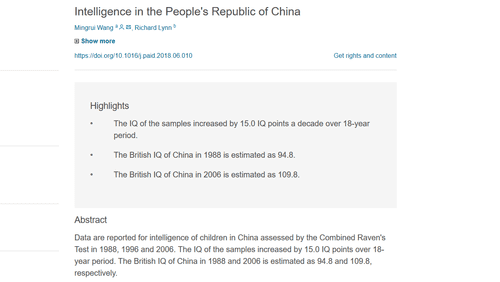
The Flynn Effect in China
08/22/2018
From Personality and Individual Differences (November 2018)
Intelligence in the People’s Republic of China
Mingrui Wang, Richard LynnAbstract
Data are reported for intelligence of children in China assessed by the Combined Raven’s Test in 1988, 1996 and 2006. The IQ of the samples increased by 15.0 IQ points over 18-year period. The British IQ of China in 1988 and 2006 is estimated as 94.8 and 109.8, respectively.
I presume this means that on a scale where the British IQ is automatically assumed to be 100, the Red Chinese averaged 95 in 1988 (when Red China was still depressingly poor). But in 2006 (when the Chinese were considerably better off), the Chinese averaged 110 versus the current British score, which is once again assumed to be 100.
But if I’m interpreting this correctly, that 15 point Chinese gain relative to the British ignores any gains (or losses) in absolute terms in Britain.
The Flynn Effect is the curious tendency finally made famous by political philosopher James Flynn for average performance on IQ tests to go up over the decades. IQ test publishers respond by repeatedly making the scoring more difficult to keep the average at 100.
In the 20th Century, the Flynn Effect generally didn’t affect the relative standings of different countries much. Everybody kind of went up together at roughly the same rate, although I calculated that Asians were on average going up fastest.
But this might be changing in more recent years. Like the Chinese more recently, South Koreans have had a larger Flynn Effect than many other countries in recent decades, just as their average height has increased a lot.
The sci-fi-like Raven’s IQ test, used here, generally saw the biggest Flynn Effect gains in the 20th Century.
In 2015, I hypothesized that the Flynn Effect might be related to a longer-term version of Moore’s Law going back perhaps to Gutenberg:
